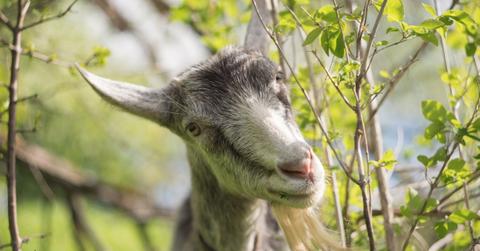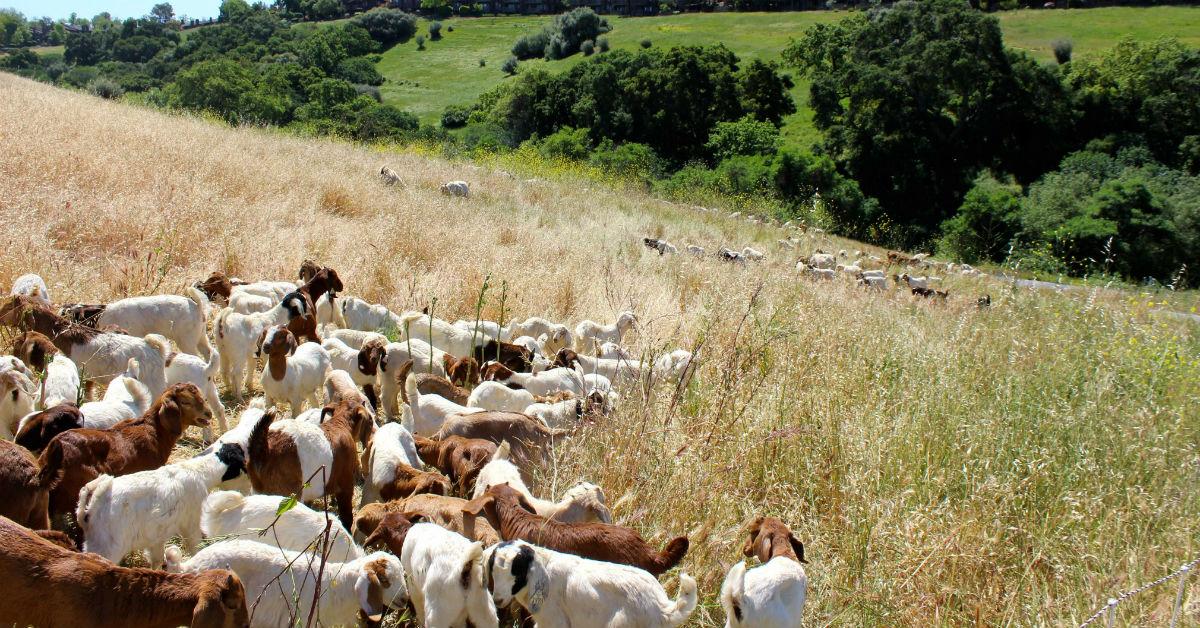Why People Are Renting Goats To Graze Their Lawns
Goat grazing services provide an eco-friendly alternative to lawn mowers and pesticides.
Updated May 31 2019, 10:48 a.m. ET

It’s hard to keep your backyard tidy and healthy without impacting the earth. Just consider the tools. Lawn mowers burn on fossil fuels, adding new carbon emissions to the atmosphere every time you push them across the grass. Then there are pesticides, which can wind up harming much more than the mites and weeds wreaking havoc on your land.
That’s why many are seeking out a more natural form of lawn care and management: goats. According to Forbes, goat rentals are becoming an increasingly popular service for homeowners and farmers looking to get their vegetation under control, with multiple companies now offering the service.
Goat rental, or goat grazing, businesses function about how you’d expect. Customers call in with a description of their land — the size, the terrain, and any other relevant specs. Then the goat rental service provides an estimate. Once the cost is settled, the two parties agree on a date of service. On that day, the goats arrive. They graze until the evening, then leave, possibly returning the next morning, depending on the size of the job. When their work is done, customers are left with a freshly manicured lawn, achieved without burning a single fossil fuel.
These businesses — Goats on the Go, Rent a Goat, Rent-a-Ruminant, and We Rent Goats, to name just a few — can deploy 100 or more goats at a time. They serve all types of clients from both the private and public sector. That includes ranchers, public land managers, golf club managers, farmers, homeowner associations, and municipalities.
Goat grazing services are available on Angie’s List, and Amazon even got in on the act in 2015, offering goat rentals as part of the beta trial for its Home & Business Services in 2015. (When you type “goat rental” into that section now, it directs you to general lawn maintenance.)
Goats offer obvious environmental benefits, since they essentially replace both mowers and pesticides. But the people who run goat grazing businesses point to many other perks. They’re excellent grazers, for one. Rough estimates claim that 38 goats can mow 50,000 square feet of grass in a single day, while more scientific research points to their unique ability to root out weeds.
According to the Noble Research Institute, goats have a natural preference for broad-leafed “forbs” like ragweed. When given a choice, they munch on forbs and woody plants 85 percent of the time and grasses only 13 percent of the time. This means they’ll go for the weeds and brush dominating the land first, tackling the problem areas immediately.
Goats don’t just eat the weeds, either. They gobble up the seeds, too, and eliminate their potential to germinate again. As Forbes explains, the goat’s digestive system sterilizes seeds as they move through the goat’s body. So when, say, a ragweed seed comes out, it’s usually unable to produce new plants.
Goats are even great for preventing wildfires, since they love eating the brush that often contributes to them. No wonder more people and cities are hiring goats for their lawn care needs — even if they are "opportunistic eaters."
